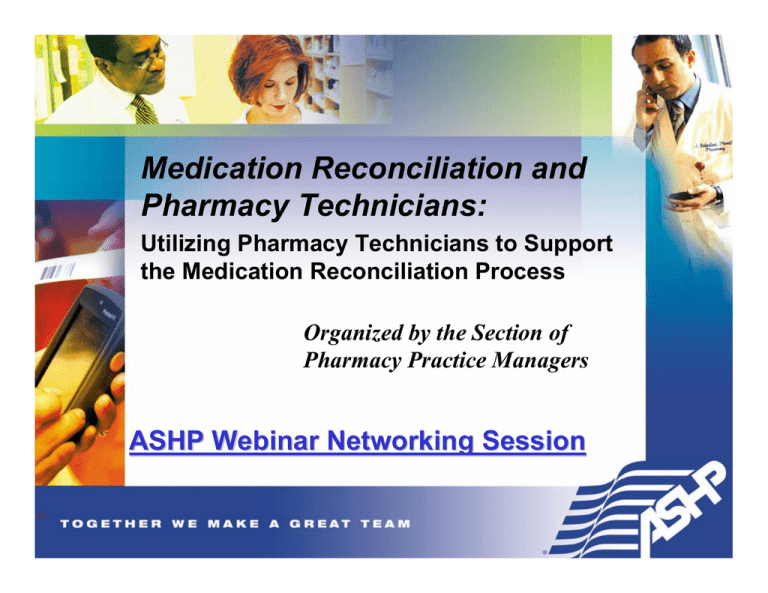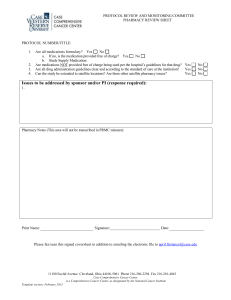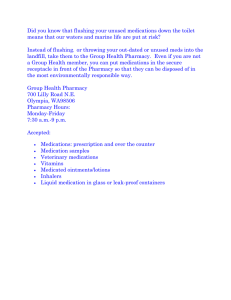Medication Reconciliation and Pharmacy Technicians
advertisement

Medication Reconciliation and Pharmacy Technicians: Utilizing Pharmacy Technicians to Support the Medication Reconciliation Process Organized by the Section of Pharmacy Practice Managers ASHP Webinar Networking Session Today’s Presenters Janinah S. Barreto, PharmD, MS The Ohio State University Medical Center, OH Steve Ebert, Pharm.D. Drea Maier, Pharm.D Meriter Hospital, WI Teri Wooton, Pharm.D. Carolinas Medical Center – Northeast, NC The Joint Commission “Medication reconciliation is the process of comparing a patient's medication orders to all of the medications that the patient has been taking. This reconciliation is done to avoid medication errors such as omissions, duplications, dosing errors, or drug interactions. It should be done at every transition of care in which new medications are ordered or existing orders are rewritten. Transitions in care include changes in setting, service, practitioner or level of care. This process comprises five steps: 1) develop a list of current medications; 2) develop a list of medications to be prescribed; 3) compare the medications on the two lists; 4) make clinical decisions based on the comparison; and 5) communicate the new list to appropriate caregivers and to the patient.” Role of Pharmacy Technician in Medication Reconciliation Janinah S. Barreto, PharmD, MS Medication Safety Pharmacist The Ohio State University Medical Center The Ohio State University Medical Center Hospitals University Hospital Ross Heart Hospital James Cancer Center University Hospitals East Dodd Rehabilitation Facility 1,000+ beds 56,000+ patient admissions 15,700+ inpatient surgeries 1,000+ admitting physicians OSUMC’s Pre-Operative Assessment Center (OPAC) Simplifies the preoperative process for OSUMC patients Coordinates preoperative needs for the medically complex (ASA 3-4) Provides education for patients prior to surgery Anesthesia, sedation, risks and benefits, before the procedure (bring medications, what and not to wear the day of surgery, what meds to stop taking, diet Coordinates tests and assessments prior to surgery OPAC Goals Increase patient satisfaction Decrease OR cancellations and delays 100% chart completion day of surgery OPAC Staff Anesthesiologist and Residents Physician Assistants RN’s Medical Assistants Pharmacy Technician Typical Patient Visit Register for OPAC & Surgery Clinic Visit is ~1 hour and 15 minutes Weight and Vitals History and Physical Anesthesia Assessment & Q&A’s Labs, EKG’s and Type Screen/Cross Education for day of surgery... Medications, etc Medications Documented in CPOE Sources of Information for Arrival Medications (i.e. “home” meds) Patient History Primary Care Physician Record Surgeon’s H&P Internal Medicine Consult OSUMC Patient Database Other Outside Records Medication List Source Documents Electronic Documentation Electronic Documentation Single Visit Patient Home Medication List Pharmacy Technician’s Role 80% of time Review and document patient’s arrival medication assuring appropriate dose, route, frequency and duration of therapy Review records for drug-drug interactions, duplication, drug-allergy interactions Assist with arrival medication order entry Pharmacy Technician’s Role 20% of time Cross-trained in IDX Medical records support Phone scheduling Participates in hospital and/or departmental committees relevant to practice area Pharmacy Technician Qualifications and Role Qualifications CPht Retail Pharmacy Experience Prescription Receiver Refill Experience Challenges Training/Competencies Limited Scope of Practice Staffing Level Nursing Perception Future Steps Pilot Study Business Unit James Cancer Hospital Ambulatory Surgical Unit QA Data analysis pre- and post-implementation Use of Technicians in the Medication Reconciliation Process Steven Ebert, PharmD, Clinical Professor of Pharmacy Clinical Supervisor Andrea Maier, PharmD Clinical Pharmacist Meriter Hospital Madison, WI Meriter Hospital 448-bed non-profit community hospital 18000 Med-Surg admissions per year 16 pharmacist shifts/24 hours 11 clinical 11 central based technician shifts/24 hours 1000 RNs on staff! Overview Decision process to utilize technicians Training and QA implemented Management/Road Blocks Implementation/logic Outcomes to date “Medication Reconciliation” at Meriter, 2003 •Nursing Medication History •“Patient Profile” “Medication Reconciliation” at Meriter, 2003 • Pre-Admit Medications • New Medications Goals for Our Hospital Create a unified, accurate medication history Reconcile medications at transition points Provide an accurate medication list to patients on discharge Med Reconciliation at Meriter Discrepancies of Various History Sources Compared to Reconciled Admission Medication List Total Discrepancies Omission Dose Frequency Formulation # Discrepancies 350 300 250 N=50 patients 200 150 100 50 0 RN ry o t s Hi Neville M, 2005 O xy R t utp in Cl &P H / ic hH P R ry o t is MD it m Ad ers d Or History of Pharmacy Effort in Medication Reconciliation at Meriter 2004 2005 2006 2007 2008 RN & MD driven = no pharmacy involvement 9 min/pt 13 min/pt 13 min/pt RN history verified & reconciled by RPh RPh enter medication histories into electronic health record Re-work of histories RPh generate discharge med list electronically More time spent on admit hx=Less time “downstream”? Admissions Discharges Added ER & Pre-procedure patients Staffing Needs Discharge process Update medications prior to admission in electronic record Benefit – upon readmission, medication list would reflect changes from current admission 3000 hours = 1.5 FTE’s Admission process 18000 admissions per year 30 minutes per admission 9000 hours = 4.3 FTE’s additional work Training Process for Technicians Developed formal training program Training sessions MR process overview & technician role Obtaining medication histories Created comprehensive training manual Provides multiple handouts for reference Mock patient interview scenarios Shadow pharmacists in ER Shadow MR technicians Lead technician is essential Quality Assurance Written knowledge evaluation Multiple choice questionnaire Performance evaluation Pharmacist evaluates patient interview skills Continued evaluation & feedback Daily “on-the-job” feedback All work is reviewed & verified by a pharmacist Roadblocks Hiring and retaining quality technicians Retraining RPhs to work with techs in clinical setting Keeping up with continued changes in responsibilities, new processes, etc. Residency Project 2007 To evaluate whether the use of trained pharmacy technicians to assist pharmacists with MR tasks can: Increase efficiency with the MR process Decrease pharmacist workload Main endpoints Pharmacist time spent on MR tasks Pharmacist satisfaction with the process Measured by pharmacist surveys Results: RPh Time Spent on Medication Reconciliation Baseline Post-Implementation 13 15 11 10 Time (min) 8.5 6.1 5 0 Per Discharge Per Admission Exclusions: ER Shift ICU Shift Central Shift Results: RPh Time Spent on Medication Reconciliation Projected 104.1 110 Time (min) 90 70 78.7 28 75.5 49.2 50 30 50.7 54.9 10 -10 MR per shift baseline Admission 35.7 39.8 MR per shift Postimplementation Discharge Average admits per shift reported Baseline: 3.9 Post: 3.6 Average discharges per shift reported Baseline: 3.3 Post: 5.8 Survey Results Percent of RPhs that Agree or Strongly Agree Baseline Post-implementation 100 81.8 80 Percent 60 89.5 77.2 72.7 45.5 40 20 100 27.3 35.3 21 5.3 0 MR allows time for other tasks MR is efficient MR done in Comfort with Comfort with timely manner tech on D/C tech admission Results of Post-Implementation Survey "Amount of time spent by RPh on MR activities has decreased" Agree Strongly Agree 27% "Efficiency of MR process has improved" Agree 73% 100% either agree or strongly agree to both statements Strongly Agree 18% 82% Progress to Date 4 FTE’s 3 technician shifts M-F, 2 shifts Sat-Sun Duties: Discharge medication lists Medication histories Update medication allergies Manage medications brought in by patient and stored in pharmacy Daily Pharmacy Workload Related to Med Reconciliation Obtain Hx Verify Hx PTA in Elect Record Tech Disch List RPh Check Disch List Enter Inpt Med Admit and Hx, Admit, Hx into Epic- Discharge- Disch- 2006 Inpt/Cath/Amb Inpt/Cath/Amb Surg- 2008? Surg/OB/ER- 7000 Minutes/Day 6000 5000 4000 3000 2000 1000 0 Pre-2005 2009 Conclusion Incorporation of pharmacy technicians into MR process: Increases pharmacist satisfaction Pharmacists feel process is more efficient Decreases average pharmacist time spent per admission and discharge Allows for expanded pharmacy involvement in MR on a greater number of patients Pharmacy Technicians in the Emergency Care Center Carolinas Medical Center Teri Wooton, PharmD, CDE Director of Pharmacy Services Background Feb ‘07 – JC Mock Survey with RFI for Med Rec & Pharmacy review of orders Mar ’07 – need for FTEs presented to Sr. Administration Apr ’07 – 8 unbudgeted FTEs approved to fill for Pharmacy Services in ECC Jun ’07 – 3 Pharmacists hired Sep’07 – Technician selection begins Technician Selection Formal interview process 1-2 days shadowing ECC Pharmacist Good communication skills Experience in pharmacy Good problem solving skills Able to withstand the environment Technician Training Background reading 3 page competency checklist Observe pharmacist x 10 interviews Perform supervised interviews x 10 patients Pharmacist signs off competency A day in the life Current hours 12:30PM – 9:00PM 7 days/week Check status board for admission icon Collect med lists from various sources Perform patient interview Document current med list in computer Print out med rec list Review with Pharmacist Put list on chart for admitting MD to sign A day in the life - continued Repeat x 15-20 patients Continue til 6:30PM 30 minute dinner break 7PM review the board with pharmacist 1-3 more patient interviews Retrieve Omnicell replenishment from Central Pharmacy Restock Omnicell cabinets Go Home Overall Success Pharmacists couldn’t do their job without them Review of orders Code participation C&S review MD Consults Tech career ladder, increased job satisfaction Positive feedback from MDs/RNs Minimized workload for admitting RN Assist with retrieval of stats Lessons Learned Involve ECC staff in design of program Cross-train techs with central staff but maintain consistent core Must have a People person Constant opportunity to evaluate techs performance Standardized documentation methods Manage expectations Future Plans Nov ’08 – expanded hours Tech: 7AM to 11PM Pharmacist: 7AM to 1AM Dec ’08 – Pilot PreOp interview OR Pharmacy Techs to perform Med Rec Today’s Presenters Janinah S. Barreto, PharmD, MS The Ohio State University Medical Center, OH Steve Ebert, Pharm.D. Drea Maier, Pharm.D Meriter Hospital, WI Teri Wooton, Pharm.D. Carolinas Medical Center – Northeast, NC Medication Reconciliation and Pharmacy Technicians: Utilizing Pharmacy Technicians to Support the Medication Reconciliation Process Janinah S. Barreto, PharmD, MS The Ohio State University Medical Center, OH Steve Ebert, Pharm.D. Drea Maier, Pharm.D Meriter Hospital, WI Teri Wooton, Pharm.D. Carolinas Medical Center – Northeast, NC



